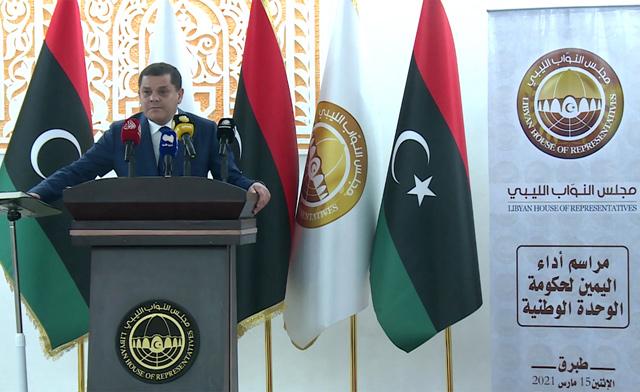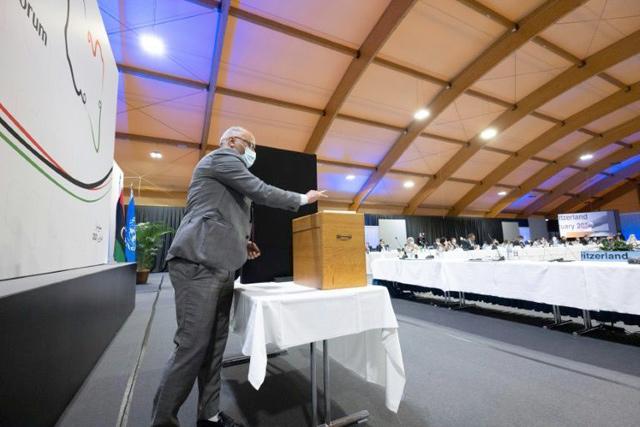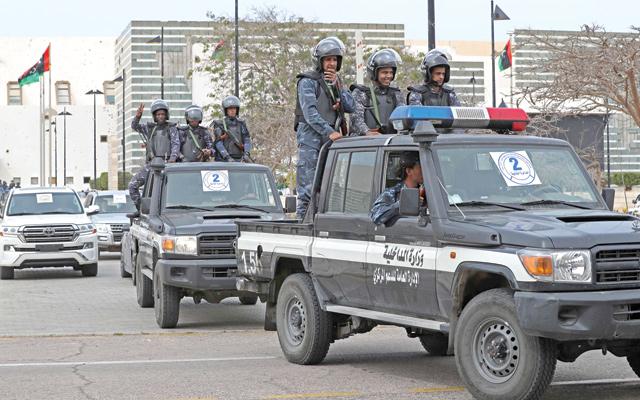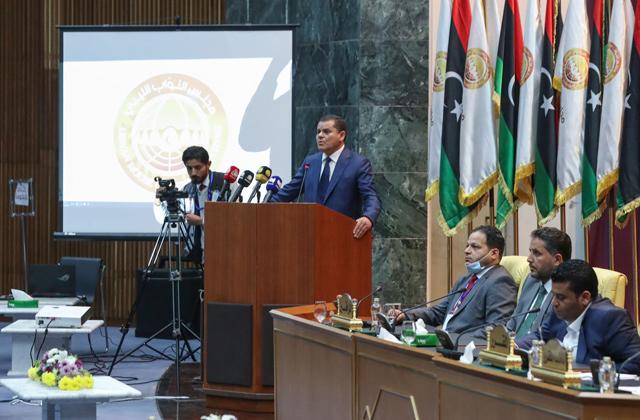You are here
Libya's new interim PM takes office
By AFP - Mar 16,2021 - Last updated at Mar 16,2021

Libya's new interim Prime Minister Abdul Hamid Dbeibah speaks after being sworn in, on Monday, in the eastern coastal city of Tobruk where Libya's new interim Prime Minister Abdul Hamid Dbeibah is to be sworn in to lead the war-torn country's transition to elections in December, after years of chaos and division (AFP photo)
TOBRUK, Libya — Libya's new interim Prime Minister Abdul Hamid Dbeibah pledged to unite divided Libya as he was sworn in Monday, preparing to steer the war-torn country to December elections.
The North African nation descended into conflict after leader Muammer Qadhafi was toppled and killed in a NATO-backed uprising in 2011, with an array of forces battling to fill the void.
A United Nations-supervised process is working to unite the country, building on an October ceasefire between rival administrations in the country's east and west.
Dbeibah, selected during talks in February alongside an interim three-member presidency council, took the oath of office in front of lawmakers in the eastern city of Tobruk.
More than 1,000 kilometres from the capital Tripoli in the west, Tobruk has been the seat of Libya's elected parliament since 2014.
Dbeibah's swearing-in comes after parliament last week approved his Cabinet, in a move hailed by key leaders and foreign powers as "historic".
The government pledged to "preserve the unity, security and integrity" of Libya with Dbeibah insisting that his Cabinet "will be the government of all Libyans".
“Libya is one and united,” he said.
Several ambassadors attended the ceremony alongside parliament speaker Aguila Saleh.
“The time has come for us to shake hands,” Saleh said, calling on Libyans to “turn the page on the past” and seek national reconciliation.
The creation of a unity government caps five months of efforts by the UN since last year’s truce between the country’s main warring factions.
The world body’s special envoy for Libya, Jan Kubis, called the event an “important step towards a unified, democratic and sovereign Libya”.
In a statement, he encouraged the new government “to swiftly embark on addressing the many challenges the Libyan people face”.
Foreign powers
Dbeibah’s government includes two deputy prime ministers, 26 ministers and six ministers of state, with five posts including the key foreign affairs and justice portfolios handed to women, a first in Libya.
The new administration is expected to replace both the UN-recognised Government of National Accord, based in Tripoli, and a parallel cabinet headquartered in the east, under the de facto control of forces backing military strongman Khalifa Haftar.
Turkey has propped up the GNA, while Haftar’s administration has drawn on support from the United Arab Emirates, Egypt and Russia.
Outgoing GNA head Fayez al-Sarraj has said he is “fully ready to hand over” power, while Haftar last month offered “the support of the armed forces for the peace process”.
But the new executive faces daunting challenges to unify the country’s institutions, end a decade of fighting marked by international interference and prepare for elections on December 24.
Mohamed Al Manfi, who heads the presidency council selected with Dbeibah last month also vowed to help cement unity before elections.
“We must be the nucleus of reconciliation ahead of the elections,” Manfi said.
Dbeibah, 61, a wealthy businessman from the western port city of Misrata, once held posts under Qadhafi but has shown no clear ideological position.
During qadhafi’s rule, his family was one of the many beneficiaries of an industrial and economic boom in Misrata.
Dbeibah is also known to be supportive of the Muslim Brotherhood and close to Turkey.
He holds a master’s degree from the University of Toronto in engineering, expertise which introduced him to Qadhafi’s inner circle and led him to head a company managing huge construction projects.
Militias and mercenaries
Dbeibah was considered an outsider compared to other candidates vying for the job, and his election process has been marred by allegations of vote-buying.
But he has jumped into his role even before his inauguration.
On Saturday he launched a national conference on combatting coronavirus, while in a bid to battle corruption he has ordered investment and other financial firms to freeze all their operations.
But after 42 years of dictatorship under Kadhafi and a decade of violence, the list of challenges is long.
Libya’s population of seven million, sitting atop Africa’s largest proven crude oil reserves, faces a dire economic crisis with soaring unemployment, crippling inflation and endemic corruption.
Another key challenge will be ensuring the departure of an estimated 20,000 mercenaries and foreign fighters still in the country, whose presence Dbeibah has called “a stab in our back”.
The UN Security Council on Friday called for all foreign forces to leave “without further delay”.
Related Articles
GENEVA — Libyan delegates at UN-led talks outside Geneva on Friday made the surprise choice of Abdul Hamid Dbeibah as prime minister of a tr
SIRTE, Libya — Libya's parliament on Wednesday approved a unity government to lead the war-ravaged North African nation to December election
Sirte, Libya — Libya's prime minister-designate urged lawmakers Tuesday to back his new government to help end a grinding civil war, denounc


















